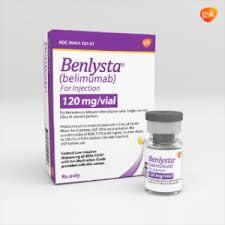Belimumab Disease Interactions
There are 3 disease interactions with belimumab.
Belimumab (applies to belimumab) depression
Moderate Potential Hazard, Moderate plausibility. Applicable conditions: History - Psychiatric Disorder
In clinical trials, depression and suicidality were reported in patients receiving belimumab. Before treatment with belimumab, the risk of depression and suicide should be assessed, considering the patient's medical history and current psychiatric status; patients should continue to be monitored during therapy. Patients receiving belimumab (and caregivers, if applicable) should be instructed to contact their health care provider if they experience new or worsening depression, suicidal thoughts or behaviors, or other mood changes. The risk and benefit of continued therapy should be considered for patients who develop such symptoms.
Belimumab (applies to belimumab) infections
Moderate Potential Hazard, Moderate plausibility. Applicable conditions: Infection - Bacterial/Fungal/Protozoal/Viral
Serious and sometimes fatal infections have been reported in patients receiving immunosuppressive agents (including belimumab). Overall, while the incidence of serious infections in controlled trials was similar between belimumab and placebo, fatal infection occurred more often with belimumab. The risk and benefit should be considered before starting treatment with belimumab in patients with severe or chronic infections. Interruption of therapy should be considered in patients who develop a new infection while receiving belimumab and these patients should be monitored closely.
Belimumab (applies to belimumab) PML
Moderate Potential Hazard, Moderate plausibility. Applicable conditions: Immunodeficiency
Cases of John Cunningham virus (JC virus)-associated progressive multifocal leukoencephalopathy (PML) resulting in neurological deficits (including fatal cases) have been reported in patients with systemic lupus erythematosus receiving immunosuppressants (including belimumab). Risk factors for PML include treatment with immunosuppressant therapies and impairment of immune function. The diagnosis of PML should be considered in any patient presenting with new-onset or deteriorating neurological signs/symptoms; a neurologist or other appropriate specialist should be consulted as clinically indicated. If PML is confirmed, belimumab should be discontinued.
Switch to professional interaction data
Belimumab drug interactions
There are 253 drug interactions with belimumab.
More about belimumab
- belimumab consumer information
- Check interactions
- Compare alternatives
- Reviews (69)
- Side effects
- Dosage information
- During pregnancy
- Drug class: selective immunosuppressants
- Breastfeeding
- En español
Related treatment guides
Drug Interaction Classification
| Highly clinically significant. Avoid combinations; the risk of the interaction outweighs the benefit. | |
| Moderately clinically significant. Usually avoid combinations; use it only under special circumstances. | |
| Minimally clinically significant. Minimize risk; assess risk and consider an alternative drug, take steps to circumvent the interaction risk and/or institute a monitoring plan. | |
| No interaction information available. |
See also:
Further information
Always consult your healthcare provider to ensure the information displayed on this page applies to your personal circumstances.


